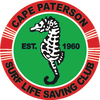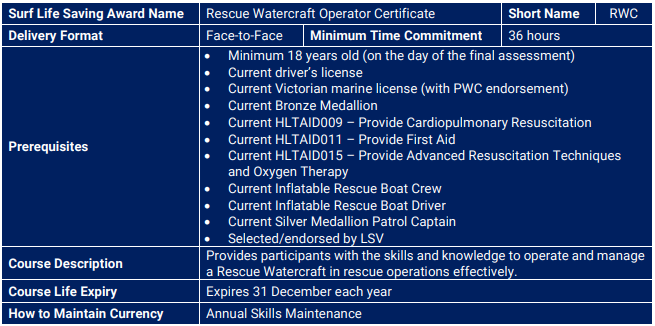WHats the difference between a Lifesaver and a Lifeguard?
Often lifesavers and lifeguards are terms used together to describe those who patrol our beaches and provide a service to the public. On the surface, their functionality is the same, however how they operate is slightly different.
Lifesavers are volunteers, who are members of a Life Saving Club and patrol certain beaches on weekends and public holidays. They hold a minimum award of Bronze Medallion (or Surf Rescue Certificate) and train at a club level. If you want to volunteer at Cape Paterson, see our Get Involved -Lifesaving page.
Lifeguards are employed through the Australian Lifeguard Service to provide public safety at beaches and waterways around the country. They work in tandem with lifesavers, and are employed 7 days a week during peak periods at differing beaches. They are members of a lifesaving club but have done addition more advanced training (such as Gold Medallion) and meet a much higher standard of fitness and skills compared to normal club members. They often work in much smaller groups: as few as two lifeguards can be stationed on one beach.
Lifesavers are volunteers, who are members of a Life Saving Club and patrol certain beaches on weekends and public holidays. They hold a minimum award of Bronze Medallion (or Surf Rescue Certificate) and train at a club level. If you want to volunteer at Cape Paterson, see our Get Involved -Lifesaving page.
Lifeguards are employed through the Australian Lifeguard Service to provide public safety at beaches and waterways around the country. They work in tandem with lifesavers, and are employed 7 days a week during peak periods at differing beaches. They are members of a lifesaving club but have done addition more advanced training (such as Gold Medallion) and meet a much higher standard of fitness and skills compared to normal club members. They often work in much smaller groups: as few as two lifeguards can be stationed on one beach.
WHat do I need to do to become a lifeguard?
Before you can begin advanced training, you must meet the following prerequisites:
Once you meet these prerequisites, you are able to apply to attend Advanced Lifesaving Camp (ALC). This camp will allow you to hone in your lifesaving skills, while simultaneously giving you a broader understanding of the emergency service industry. The application for this camp will come out around June via LSV Circulars and will also be sent out into the Patrol CPSLSC Team App.
To successfully complete this camp, you must:
Note: If you don't pass the 800m swim, you can still become a lifeguard but you won't receive your Gold Medallion.
You will then be given an opportunity to apply for a job after the camp. You will get an interview and then if successful, begin your first season as a Trainee Lifeguard.
In the future, you may become a: Lifeguard, Lifeguard Team Leader or even a Chief Lifeguard
- Be a minimum of 17 years of age
- Be current in your Bronze Medallion
- Hold your IRB Crew
- Hold a current Advanced Resuscitation Techniques award (HLTAID015)
- Hold a current First Aid award (HLTAID011)
- Hold your Silver Medallion Patrol Captain
- Be endorsed by your club (speak to Club Captain) [Required for application process to ALC]
- Have at least 2 seasons patrol experience [or as required to complete SMPC]
Once you meet these prerequisites, you are able to apply to attend Advanced Lifesaving Camp (ALC). This camp will allow you to hone in your lifesaving skills, while simultaneously giving you a broader understanding of the emergency service industry. The application for this camp will come out around June via LSV Circulars and will also be sent out into the Patrol CPSLSC Team App.
To successfully complete this camp, you must:
- Complete an 800m open-water swim in less than 14 minutes
- Complete your 'mission' in less than 25 minutes: 200m surf swim + 800m run + 200m board paddle + 800m run
- Complete a complex board rescue 200m offshore
- Complete a complex tube rescue 100m offshore
- Complete a one person drag from the waters edge
- Pass a theory test
Note: If you don't pass the 800m swim, you can still become a lifeguard but you won't receive your Gold Medallion.
You will then be given an opportunity to apply for a job after the camp. You will get an interview and then if successful, begin your first season as a Trainee Lifeguard.
In the future, you may become a: Lifeguard, Lifeguard Team Leader or even a Chief Lifeguard
What beaches can I lifeguard at?
There are a lot of beaches around the state you can lifeguard at, however it will depend on which region you applied for. Bass region which encompasses Cape Paterson involves:
There is also the Bass RWC (Jetski) service which operates out of Fairhaven but this requires additional training.
- Cowes (2 guards)
- Smiths Beach (3 guards)
- Woolami Beach (5 guards)
- Inverloch (3 guards)
- Venus Bay (4 guards)
- Waratah Beach (2 guards)
- Tidal River Norman Beach (2 guards)
There is also the Bass RWC (Jetski) service which operates out of Fairhaven but this requires additional training.
Can I Lifeguard at a pool?
Unfortunately, unless you hold your Pool Lifeguard certification, you cannot lifeguard at a pool with your Gold Medallion.
I'm a pool lifeguard, can i lifeguard at a beach?
Unfortunately, although similar in nature, beach lifeguarding requires a much higher level of fitness and skills and operates slightly differently. As such in order to lifeguard at a beach, you need to attend ALC as described above.
GOT MORE QUESTIONS?
If you want to know more, or want a guide through this often convoluted process, reach out to the patrol team. You can get in touch via the Team App, seeing us on the beach or emailing [email protected] (Liam M) and we'll help you out
ADVANCED INFO
© Cape Paterson Surf Life Saving Club Inc.
Compliance Note:
Cape Paterson Surf Life Saving Club partner with Life Saving Victoria (LSV), which is a registered training organisation (RTO 21799) regulated by the Australian Skills Quality Authority (ASQA), to deliver vocational education and training services. We are recognised as a provider of quality-assured and nationally accredited qualifications. As such our courses have pre-requisites and standards that must be met including minimum training times.
Pages on this website will display club-specific information as well as state and nationally regulated information. To differentiate what is club specific, look out for a [Club Specific] marker or a disclaimer describing the process as Cape Paterson-Specific
Cape Paterson Surf Life Saving Club partner with Life Saving Victoria (LSV), which is a registered training organisation (RTO 21799) regulated by the Australian Skills Quality Authority (ASQA), to deliver vocational education and training services. We are recognised as a provider of quality-assured and nationally accredited qualifications. As such our courses have pre-requisites and standards that must be met including minimum training times.
Pages on this website will display club-specific information as well as state and nationally regulated information. To differentiate what is club specific, look out for a [Club Specific] marker or a disclaimer describing the process as Cape Paterson-Specific



